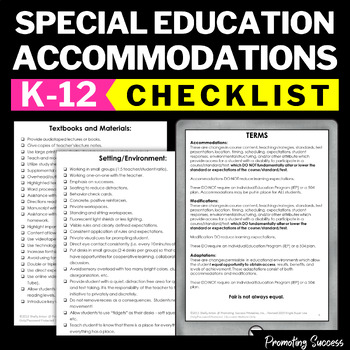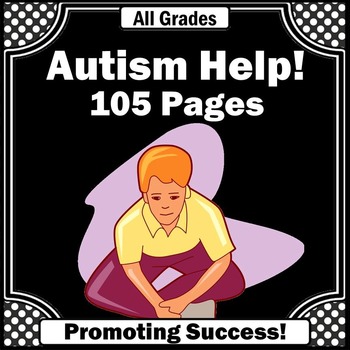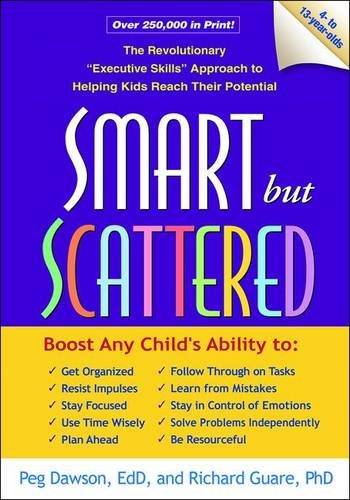Click HERE to view our Teachers Pay Teachers Promoting Success store.
Note: This blog post contains resources from our TpT store and Amazon Associate store.
--------------------------------------------
A student with ADHD can present unique challenges in the classroom. Inattention, hyperactivity, or impulsivity can be the source of frustration, but there are ways teachers can help students with ADHD to improve the educational experience and control the symptoms of the disorder. It is important for teachers to be aware of coexisting conditions such as learning disabilities, as well as reinforcing the importance of classroom and instructional structure.
Here are some teaching strategies for teachers of students with ADHD.
- Work on the most difficult concepts early in the day;
- Give directions to one assignment at a time instead of directions to multiple tasks all at once;
- Vary the pace and type of activity to maximize the student's attention; and
- Structure the student's environment to accommodate his or her special needs. For example, the student can be seated away from potentially distracting areas (such as doors, windows, and computers) or seated near another student who is working on a shared assignment.
Behavioral approaches represent a broad set of specific interventions that have the common goal of modifying the physical and social environment to alter or change behavior (AAP, 2001). They are used in the treatment of ADHD to provide structure for the child and to reinforce appropriate behavior. Those who typically implement behavioral approaches include parents as well as a wide range of professionals, such as psychologists, school personnel, community mental health therapists, and primary care physicians. Types of behavioral approaches include behavioral training for parents and teachers (in which the parent and/or teacher is taught child management skills), a systematic program of contingency management (e.g. positive reinforcement, "time outs," response cost, and token economy), clinical behavioral therapy (training in problem-solving and social skills), and cognitive-behavioral treatment (e.g., self-monitoring, verbal self-instruction, development of problem-solving strategies, self-reinforcement) (AAP, 2001; Barkley, 1998b; Pelham, Wheeler, & Chronis, 1998).
In general, these approaches are designed to use direct teaching and reinforcement strategies for positive behaviors and direct consequences for inappropriate behavior. Of these options, systematic programs of intensive contingency management conducted in specialized classrooms and summer camps with the setting controlled by highly trained individuals have been found to be highly effective (Abramowitz, et al., 1992; Carlson, et al., 1992; Pelham & Hoza, 1996). A later study conducted by Pelham, Wheeler, and Chronis (1998) indicates that two approaches-parent training in behavior therapy and classroom behavior interventions-also are successful in changing the behavior of children with ADHD. In addition, home-school interactions that support a consistent approach are important to the success of behavioral approaches.
The use of behavioral strategies holds promise but also presents some limitations. Behavioral strategies may be appealing to parents and professionals for the following reasons:
- Behavioral strategies are used most commonly when parents do not want to give their child medication;
- Behavioral strategies also can be used in conjunction with medicine (see multimodal methods);
- Behavioral techniques can be applied in a variety of settings including school, home, and the community; and
- Behavioral strategies may be the only options if the child has an adverse reaction to medication.
The research results on the effectiveness of behavioral techniques are mixed. While studies that compare the behavior of children during periods on and off behavior therapy demonstrate the effectiveness of behavior therapy (Pelham & Fabiano, 2001), it is difficult to isolate its effectiveness. The multiplicity of interventions and outcome measures makes careful analysis of the effects of behavior therapy alone, or in association with medications, very difficult (AAP, 2001). A review conducted by McInerney, Reeve, and Kane (1995) confirms that the effective education of children with ADHD requires modifications to academic instruction, behavior management, and classroom environment. Although some research suggests that behavioral methods offer the opportunity for children to work on their strengths and learn self-management, other research indicates that behavioral interventions are effective but to a lower degree than treatment with psychostimulants (Jadad, Boyle, & Cunningham, 1999; Pelham, et al., 1998).
Behavior therapy has been found to be effective only when it is implemented and maintained (AAP, 2001). Indeed, behavioral strategies can be difficult to implement consistently across all of the settings necessary for it to be maximally effective. Although behavioral management programs have been shown to enhance the academic performance and behavior of children with ADHD, followup and maintenance of the treatment is often lacking (Rapport, Stoner, & Jones, 1986).
In fact, some research has shown that behavioral techniques may fail to reduce ADHD's core characteristics of hyperactivity, impulsivity, and inattention (AAP, 2001; U.S. Department of Health and Human Services [DHHS], 1999). Conversely, one must consider that the problems of children with ADHD are seldom limited to the core symptoms themselves (Barkley, 1990a). Children frequently demonstrate other types of psychosocial difficulties, such as aggression, oppositional defiant behavior, academic underachievement, and depression (Barkley, 1990a). Because many of these other difficulties cannot be managed through psychostimulants, behavioral interventions may be useful in addressing ADHD and other problems a child may be exhibiting.
ADHD Classroom Strategies, Jon Weinberger 5th Grade Teacher
------------------------------
ADHD Research Based Teaching Strategies
Strategies include:
1. At the beginning of the lesson, tell the students exactly what they are going to learn.
2. At the beginning of the lesson, tell the students exactly how they are expected to behave.
3. Keep instructions simple.
4. Small groups make it easier.
5. Structure is important, along with less, but clearly defined, rules.
6. Focus on three behaviors to monitor.
7. Don't embarrass to get back on task. Work out a private cue.
8. Allow movement.
9. Use colors in presentations and use manipulatives.
10. Provide a variety of activities.
--------------------------------------
Click HERE for over 140 FREE printable activities to help you on your teaching journey.
You are appreciated!
-------------------------------------
You may also like these resources from our TpT store:
For a checklist of 175+ accommodations, click the picture:
---------------------------------------
You may also like these resources from our Amazon Associate store:
-------------------------------------
Please click HERE to see more books and resources from my Amazon store. I've searched for the best-selling and/or highest rated teaching resources for you! (I earn a small commission.)
---------------------------------------------------------
Click HERE to view our Teachers Pay Teachers Promoting Success store.
Shelly Anton is a participant in the Amazon Services LLC Associates Program, an affiliate advertising program designed to provide a means for sites to earn advertising fees by advertising and linking to Amazon.com. ** This means there are Amazon affiliate links in these blog posts. This does not mean you pay a dime more when you purchase a product through the link. It just means I am trying to save you valuable teacher time by making it easier for you to find valuable resources for your students, and I earn a few cents for my research and time. Thank you for all you do for kids!












